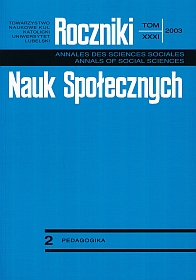Two Aspects of the Old Age on the Basis of an Analysis of Ernest Hemingway's The Old Man and the Sea and The Old Man at the Bridge
Abstract
The article discusses the problem of the old age. It shows two aspects of it that are presented in Ernest Hemingway's The Old Man and the Sea and The Old Man at the Bridge. Through the attitudes of the works' protagonists the complexity and heterogeneity of that phenomenon are proven. The article tries to show that the old age, like any other stage of human life, not only takes something away, but also gives new values. Old people do not constitute a homogeneous group; each individual experiences the old age in the way that is typical of himself or herself only.
The old people from the works by Ernest Hemingway are a perfect example. They prove that there is a certain category of people who experience `the third age' not only in a cheerful and dignified way, but also as a period that gives them new possibilities of development and activity. On the other hand they are proof of the fact that one can assume a different attitude towards the old age – one of passive resignation, sometimes changing into the state of desperate escape connected with confining oneself to one's own world.
The characterization of the old age and of getting old based on the literature of the subject made it possible to define these two notions from the point of view of biology, psychology and philosophy. The attitudes of an old man have become the key problem here; the attitudes towards life, death, the world, people, and especially towards one's own senility. Defining its specificity allows drawing a full image of the old age.
A literary analysis of the two aspects of the old age in Ernest Hemingway's stories proves the thesis that there are as many old ages as people who are getting old. The stories are a source of knowledge concerning the old age and getting old, problems and joys of this stage of life. They also have an educational function. The protagonists of the works are ready to share their wisdom and experience, they are authorities, `the guards of the collective memory', `guides to the life of young people' and people who form and maintain the bonds between generations.
Ernest Hemingway's stories The Old Man and the Sea and The Old Man at the Bridge are also an inspiration for undertaking the work of self-education for the old age. Each man prepares his own way of experiencing the old age during all of his life as senility grows together with us and its quality depends on our ability to understand its meaning and value.
Copyright (c) 2003 Roczniki Nauk Społecznych

This work is licensed under a Creative Commons Attribution-NonCommercial-NoDerivatives 4.0 International License.


